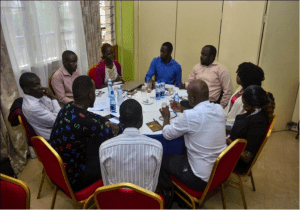By Loyce Kyogabirwe|

The United Nations (UN) has recognised data as a key factor for achieving and monitoring sustainable development. Indeed, the push for open data that contributes to government transparency and accountability and promotes citizens’ right to information and innovation through the Information and Communication Technology (ICT) sector continues to gain prominence globally, including in Africa.
In Uganda, the government is geared towards contributing to the emerging data revolution for sustainable development. Since 2016, the country has been party to the African Charter of Statistics and is also working to implement the UN Fundamental Principles of National Official Statistics as well as the Cape Town Action Plan. Uganda has also developed the National Development Plan and is party to regional development agendas such as Agenda 2063 and the East African Community’s Vision 2050.
Continue Reading →
Category: News
Use of ICT to Improve the Health of Preterm Infants in Kenya
Neonatal mortality remains a key issue of public health concern in Kenya and currently stands at 22 per 1,000 live births [2]. Premature births (less than 37 completed weeks of gestation) accounts for 12% of all under 5 mortality in Kenya and approximately over 180,000 infants in Kenya are born prematurely every year [3]. Preterm infants need admission to a Neonatal Intensive Care Unit (NICU) where care is mainly focused on infants thus neglecting the role of mothers. Most mothers of infants born prematurely often suffer from depression, grief, and guilt, which are rooted in not giving birth to a healthy baby [1,10]. Extended periods of separation from the baby, the absence of information or lack of understanding, loss of parental roles, fear of possible outcome and lack of communication with health care providers aggravate the difficulties experienced by mothers regarding prematurity [9, 10].
Continue Reading →
Civic Technology in Uganda: A Data & Design Perspective
Workshop |

Are you a techie that’s looking to harness technology and design for the public good? Are you part of a government department or civil society organization interested in how data can improve public service delivery? Want to know what “service design” is all about? Then, this is the event for you!
We have partnered with Pollicy, a civic technology organisation and are excited to bring you the latest in civic technology in Uganda, with a focus on data and design. As issues of data ownership, digital security, censorship become more pertinent in our society, so does the need to appropriately harness the benefits of big data.
Study Reveals that a Culture of Secrecy Among Public Officials Hinders Media Work in Tanzania
By MISA Tanzania Correspondent |
A prevailing culture of secrecy among public officials in Tanzania at both central and local government levels is hindering the work of journalists, according to findings by a recent study. This is affecting access to information necessary for media reporting towards increased civic participation, transparency and accountability in governance.
The study which was conducted by the Media Institute of Southern Africa (MISA) Tanzania Chapter in partnership with the Collaboration on International ICT Policy for East and Southern Africa (CIPESA) assessed the responsiveness of local government authorities (LGAs) and central government offices in Tanzania to citizens’ information requests.
Continue Reading →
Access to Public Information in Uganda: Rhetoric or Reality?
By Loyce Kyogabirwe
Norah Owaraga, a Ugandan researcher, recently narrated her experience on accessing government-held information in the country. She recounted a trip to Tororo district in eastern Uganda where she sought information on Tuberculosis prevalence in prisons. “I was told to go back to the prisons headquarters in Kampala (the capital) to get authorisation yet I had already received clearance from Uganda National Council for Science and Technology (UNCST) and the President’s Office to access government information. Why did I have to travel back to Kampala when I had all the clearance?” asked Owaraga.
Her question was directed at Frank Baine, the spokesperson of Uganda Prisons, during a dialogue held in Kampala to commemorate the International Day for Universal Access to Information, which falls on September 28.
Continue Reading →
Stimulating the Civic Tech Arena in Uganda
By Daniel Mwesigwa
For many citizens across Africa, technology has not only bridged the communication gap between citizens and businesses, but also between governments and citizens. The potential of technology in enabling citizens to participate in governance processes, access public services, and engage with duty bearers has largely gained prominence due to the high internet penetration rates, increasing use of social media and a rise in civic consciousness.
At a recent civic tech showcase in Uganda, it emerged that, as in the rest of Africa, there was growing potential and enthusiasm in the country, with a wide variety of tools deployed by government, civil society and technologists to facilitate social accountability and citizen journalism. The challenge however, remains of creating awareness among citizens for wider adoption of the tools and collaboration among actors to ensure synergies and avoid duplication of efforts.
Continue Reading →
How ICT is Transforming Kenya’s Largest Slum
By Lilian Kaivilu |
A dusty and rough road leads to Kibera informal settlements in Kenya’s capital-Nairobi. Residents here are seemingly busy, braving the day’s heat and dust to put food on the table.
In most informal settlements, crime, congestion, poor sanitation and poverty are often used as the best descriptions of life therein. Congestion is perceived as the real picture in the slums. Many perceive the informal settlements, just like Kibera, as the source of cheap labour for the city industries.
But on this particular afternoon, CIPESA-ICT4Democracy in East Africa Media Fellow, Lilian Kaivilu, discovers another side of Kibera; a beautiful, tidy, organized and developed face of Kibera that few people know about. Let us call it ‘The Other Kibera’. Here, the use of Information Communication Technology (ICT) is rife. One would be forgiven to believe that he or she is actually in the middle of the city.
Continue Reading →
Promoting Youth Participation in Governance Through ICT in Kenya
By Tracy Kadesa |

Youths have emerged at the forefront of online activism and citizen journalism in Kenya. During a December 2016 to March 2017 strike by doctors, young doctors shared their grievances online, ranging from lack of resources in government hospitals to inadequate staffing and poor compensation. One of the stories was that of Dr. Ouma Oluga, the secretary general of the Kenya Medical Practitioners, Pharmacists and Dentists Union, who shared how he had to perform a caesarean section using a torch on his mobile phone due to a power outage. He was only 27 at the time.
Continue Reading →
CIPESA Engages Ugandan Members of Parliament on Implementation of Access to Information Law
By Loyce Kyogabirwe |
It is 12 years since Uganda passed an access to information law with the purpose of promoting transparency and accountability in all organs of the state by providing the public with timely, accessible and accurate information. The law also empowers the public to scrutinise and to participate in government decisions. However, the law has remained largely unimplemented as many Ministries, Departments and Agencies (MDAs) ignore citizens’ requests for information and rarely release information pro-actively, which contravenes the law.
Continue Reading →
Young Social Media Enthusiasts in Kenya Trained on Internet Law and Digital Security
By Shitemi Khamadi |
In 2015, Allan Wadi, became the first Kenyan to be convicted of hate speech online. At a May 2017 training on internet and the law, he expressed gratitude for the opportunity to acquire skills and knowledge to avoid future arrest and prosecution. While he is currently facing an incitement to violence charge over a comment he made on Facebook in February 2016, he said he is now more aware of the extent of his rights and limitations with respect to the rights of others.
Continue Reading →

